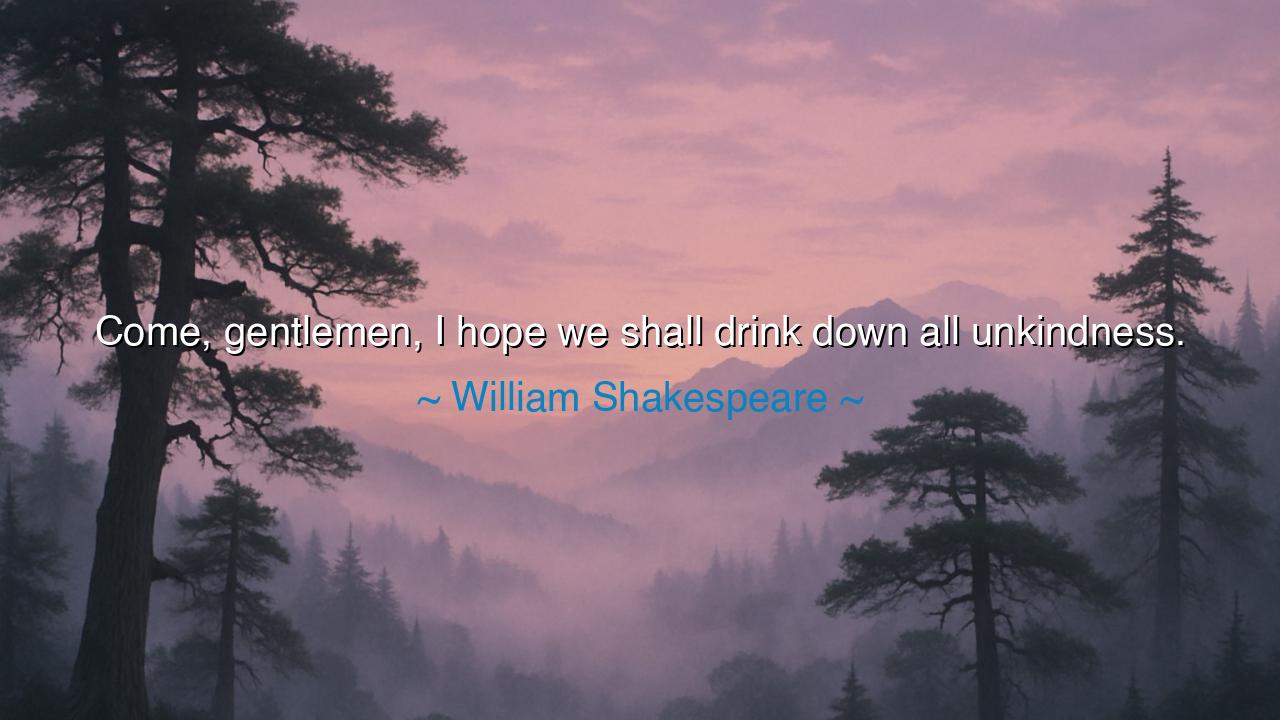
Come, gentlemen, I hope we shall drink down all unkindness.






“Come, gentlemen, I hope we shall drink down all unkindness.” These words, spoken by William Shakespeare in The Merry Wives of Windsor, echo not merely as a call to toast but as a summons to reconciliation. In this simple phrase, the Bard captured an eternal truth—that in the fellowship of good company, the bitterness of the human heart can be dissolved, like salt in the sea, through the warmth of shared spirit and understanding. The cup of wine, in this sense, becomes not a vessel of mere pleasure, but a sacred chalice of forgiveness. When we raise it with sincerity, it carries not only the flavor of the vine but also the sweetness of renewed friendship and peace among men.
In the days of old, feasts were not only for sustenance but for mending what was broken. Kings and warriors would sit at the same table after battle, their armor still gleaming with the dust of strife, and they would drink down unkindness, sealing their peace not with treaties alone, but with the communion of shared bread and drink. To drink together was to declare: the past shall no longer rule the heart. The ancients knew that enmity cannot thrive where laughter flows, nor can resentment breathe where the air is filled with honest cheer.
This quote, though gentle in tone, carries the heroic spirit of forgiveness. It calls us to rise above pettiness, to master not others, but ourselves. For what is man’s greatest conquest if not over the storms within his own soul? The act of drinking down unkindness is symbolic—it is to let go of the poison of pride and the venom of vengeance. It is to pour peace where once there was fire. As in all things human, the victory over self is the noblest of triumphs.
Consider, for a moment, the story of Abraham Lincoln, who during the cruel years of war was often slandered, mocked, and opposed by those around him. Yet when the Union’s victory came, he spoke not of revenge, but of mercy. “With malice toward none, with charity for all,” he said. In those words, Lincoln too invited his people to drink down all unkindness, to let the shared pain of war become a bond of unity rather than a wedge of hatred. He understood that to rebuild a nation, one must first heal the heart.
The wisdom of Shakespeare’s line thus endures, whispering through centuries: there is more honor in forgiveness than in the sharpest sword. For hatred burns the vessel that holds it, while kindness nourishes both giver and receiver alike. When we choose to forgive, we do not diminish justice; rather, we elevate humanity. To drink down unkindness is to transform bitterness into strength, and memory into compassion.
Let each of us, then, remember this teaching when we find discord among our fellows. When a friend has wronged us, or pride has erected its cold wall between souls once united, let us be the first to offer the cup. Let us say, “Come, let us drink down all unkindness,” and in that act, let the frost melt from our hearts. Such gestures, though small in the eyes of the world, carry the power to remake the very fabric of our lives.
The lesson is clear and eternal: peace begins not in treaties, but in hearts that forgive. Therefore, let the reader practice the art of reconciliation—speak kindly when others expect anger, offer warmth when met with coldness, and extend your hand even when it trembles. For in doing so, you shall find not weakness, but the great strength of the soul at peace.
And when the day comes that you sit among friends or even among those once called enemies, remember Shakespeare’s words. Lift your cup—not merely of wine, but of goodwill—and let it be said of you: This one knew how to drink down all unkindness.






AAdministratorAdministrator
Welcome, honored guests. Please leave a comment, we will respond soon